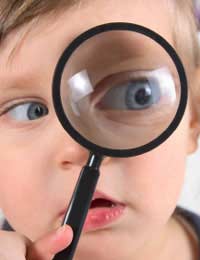Signs Your Child has Poor Vision

If there is anything wrong with your child’s vision, you, rather than your child, will probably be the first to be aware of it. Children have no experience of how they should see things, so they assume that they see things in the same way as everyone else does.
Although your child may not show signs of vision problems at first, it’s important to be vigilant. As your child grows, there are quite a few signs you can look out for that may indicate visual problems. If you are alerted by any of these signs you should have your child examined by an optical professional (an ophthalmologist or an optometrist) as soon as possible.
Early Eye Development
Your baby’s eyes will usually be examined at birth. This first examination for physical defects is very important, as the earlier that problems are identified, the greater the chances of successful treatment will be.In the first six to eight months your baby will only be aware of shapes and objects will probably be blurred. Up to this age, each side of the body is developing alternately so, in the same way that you may notice the movements of hand and feet on just one side, one eye may turn towards the nose, indicating that only the other eye is being used. A few days or weeks later the situation will be reversed. This is normal.
At 12 months, your child will have become more mobile and inquisitive and able to judge distances and the relative size of objects. In two to three years the child will be talking and getting involved in activities such as drawing and painting. At this stage your child should be given a thorough professional eye examination, in which tests will be carried out for short- or long-sightedness and any evidence of a squint (crossed eyes).
What to Look Out for
The most common visual problems in children and, indeed, adults result from long- or short-sightedness or astigmatism. Any of these conditions leads to focussing difficulties – well known problems that teachers and parents usually look out for.Long-sightedness makes it difficult to focus on near objects, whereas short-sighted people can read quite easily but have difficulty with distant objects. Astigmatism causes objects to appear distorted and out of focus.
There are quite a number of other potential problems that can affect your child’s vision and, although not an exhaustive list, these are some of the indicators that you should look out for:
The Appearance of the Eye
- Misalignment of the eyes. One eye turns in either direction while the other points straight ahead.
- Jerky eye movements
- Frequent blinking
- Frequent watering
- Slow or unequal dilation or constriction of the pupils
- Squinting
- White pupil
- Redness
Some Behavioural Symptoms
- Inability to recognise distant people or objects
- Tilting of the head when looking at something
- Over-sensitivity to light
- Covering of one eye while reading
- Sitting very close to the TV
- Screwing up eyes while watching TV
- Complaining of blurred vision or of seeing double
- Complaining of headaches
- When reading, the child holds the book very close, or loses the place very often.
- Poor concentration
- Avoiding reading
- Mixing up words or letters in text
- Poor hand-to-eye coordination
- Rubbing the eyes
- Crooked and inconsistent writing
- Before the age of three
- Before starting school
- At intervals during schooling, as advised by the optician


Re: What is Vitrectomy Surgery?
I had vitrectomy 4 weeks ago. The surgery was not well done as apparently bleeding occurred. The hole did not close despite having…
Re: Glasses or Contacts?
I need a eye exam and new glasses it's been since 2013/ I have no income I lost my boyfriend last September and I've been homeless ever…
Re: Eyewear for the Partially Sighted
This extract from your text is not clear and the grammar is poor- and the letters in the validation box are mixed…
Re: Eye Cancer Symptoms
I have yellow in both eyes lools like 2 dots. But looks like its makin the white part of my eye yellow whats wrong with me
Re: Are my Glasses Affecting my Eyes?
Hi, Please can anyone give advice on wearing varifocals. After a short while I develop a severe ache in my left eye and…
Re: Are my Glasses Affecting my Eyes?
On wearing my new varifocals, I am finding that my left eyeball hurts so much it feels like it will explode after 15…
Re: What is the Cause of my Itchy Eye?
I have One and only One itchy eye that has been going on 24/7 for 5 weeks.Eye is not swollen vision not affected. Eye doc…
Re: Contact Lens Trials Explained
Hi, We wanted to get in touch with you to increase traffic on your website. Please reply to this email so we can send you free…
Re: What Are Photoreceptors?
I have a 10 year old grandson who was diagnosed at apx 2 with cone and rod dystrophy eye disease. Please help with any treatment…
Re: Driving and Eyesight
Danny6520 - Your Question:Hi,I am only 16, but soon I will be 17and I am hoping to drive. However I have a few problems. Firstly, I am…